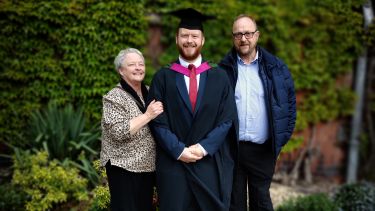I still use what I learned in clinical practice on a daily basis

Why did you decide to study Clinical Neurology at the University of Sheffield?
“I studied a large amount of neuroscience in my undergraduate degree and the Clinical Neurology course at Sheffield was a natural progression of this. The course looked very interesting as it provided clinic time in the local hospital with neurologists teaching on the course.
“As for why I chose Sheffield I really enjoy the outdoors and having the Peak District at my doorstep was a huge selling point. It gave me access to a large amount of hiking and cycling routes while also living in a large city. Sheffield has a great culture with a lovely local bar scene which I really enjoyed when visiting the city prior to starting the course so it really sold the desire to study here.”
What did you enjoy most about your studies?
“The time spent in the anatomy lab was really enjoyable. The ability to dissect and study the human brain at such a level is not routinely offered and is something that set Sheffield apart from other courses. It really gave you an appreciation of the human brain.
"Being provided clinic time within neurologist clinics gave deep insight into the conditions you were studying and enabled me to see the impact these conditions had on patients in their day-to-day lives.”
Aidan Rossiter
MSc Clinical Neurology
What research project did you carry out during the course?
“My research project was around attitudes toward driving following a transient ischaemic attack (TIA). This involved me working in the stroke ward in the Royal Hallamshire Hospital on the TIA clinic.
“I was tasked with a qualitative study that involved interviewing patients in the weeks following their TIA and exploring their understanding of the event and their confidence about returning to driving, as they were required to not drive between initial presentation and follow up in the clinic.
“The research showed that a lot of patients have a poor understanding when first presenting with a TIA (typically in a GP setting) and this was something that needed to be addressed so they understand the implications around not driving and arguably TIAs too.”
In what ways has the masters informed your role as a Lead Physician Associate?
“So, the role of the physician associate was recommended to me by one of the consultants while in the clinic with them. It was a more patient-facing role which I really enjoyed while studying Clinical Neurology. Now that I am on the other side of the fence referring patients into TIA clinics I’ve found myself really trying to explain the event and why we are referring them onwards.
“Overall the whole course gave me a step-up when it came to the neurology portions of my Physician Associate course, which I also studied at Sheffield. I still use what I learned in clinical practice on a daily basis.
“Looking to the future I would be interested in pursuing a neurology role as a Physician Associate, and I feel the Clinical Neurology course gave me the learning and understanding to pursue this.”
What would you say to a student thinking of studying Clinical Neurology at Sheffield?
“Enjoy it! The city itself is lovely with great green spaces and such a welcoming atmosphere. For being such a large city everyone is so nice and hospitable. The university offers so much support for your studies and the union is fantastic with a plethora of societies to try out. Anyone who studies here will really love it and make friends for life.”

Masters study discovery afternoon
See where a Sheffield masters could take you with our on-campus event. Get expert advice, take a campus tour and chat to current students.

